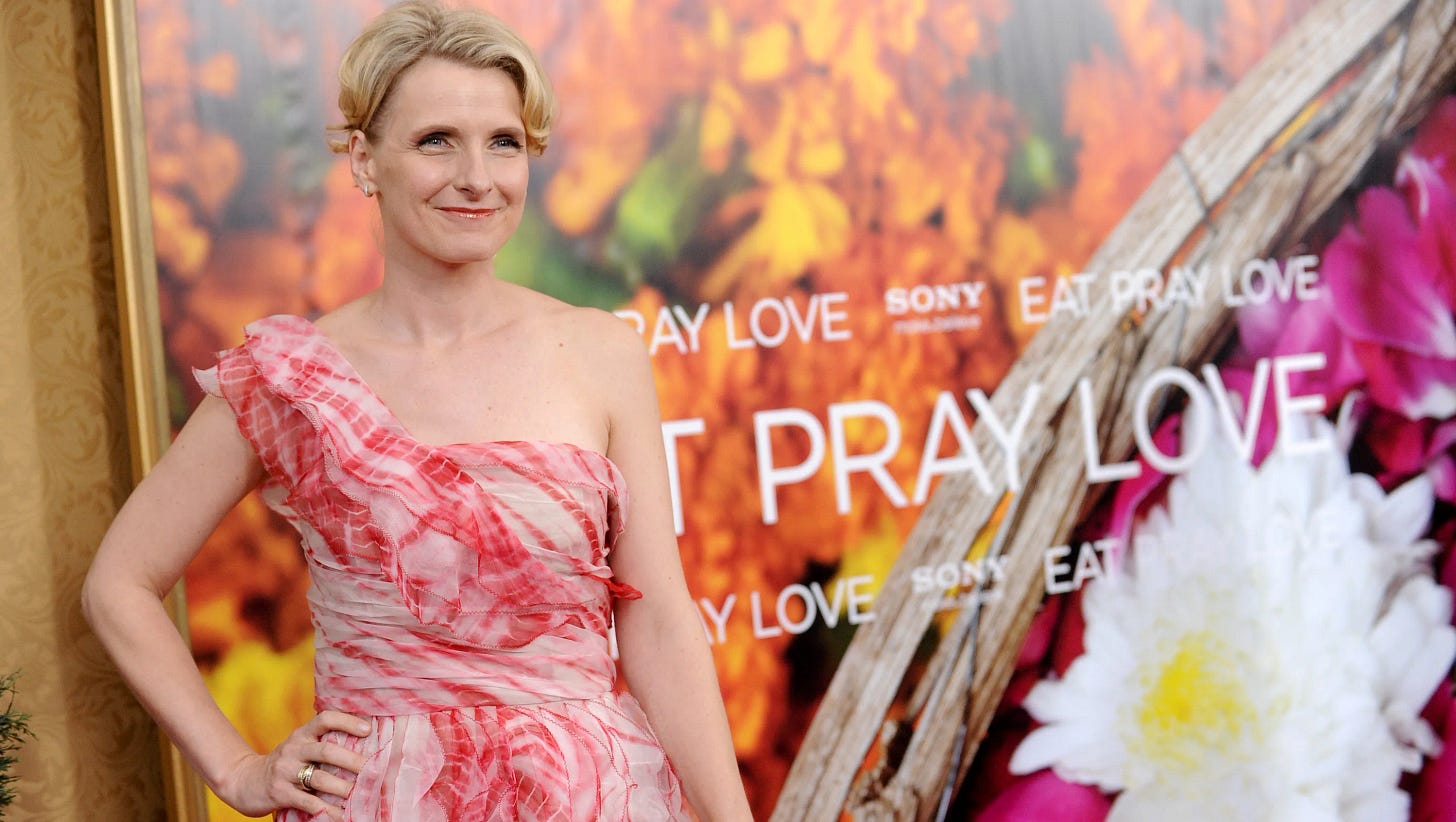What Happened to Liz Gilbert?
A once-courageous author caves to the stupidest cancel campaign of all time
There’s a voice I turn to when I feel weighed down and choked up by people’s reactions and opinions. When I’m worried about being yelled at, or misunderstood, or cancelled for something I say or write. When I feel their hands at my throat or their fists in my gut telling me “You have no right to say these things.”
The voice says:
You do not need anybody’s permission to live a creative life…You want to write a book? Make a song? Direct a movie? Decorate pottery? Learn a dance? Explore a new land? You want to draw a penis on your wall? Do it. Who cares? It’s your birthright as a human being, so do it with a cheerful heart… let inspiration lead you wherever it wants to lead you. Keep in mind that for most of history people just made things, and they didn’t make such a big freaking deal out of it.
That voice is Elizabeth Gilbert’s, writing in her 2015 book Big Magic: Creative Living Beyond Fear. Which is why it was pretty shocking to hear the news that she has pulled the release of her latest novel over what may well prove to be the silliest and most cynical outrage grift of 2023.
Who is Elizabeth Gilbert?
If you don’t know who Liz Gilbert is, I’m not sure what rock you’ve been living under, but back in the early 2000’s, she had a massive hit with her mega-bestselling memoir, Eat, Pray, Love. It was turned into a movie starring Julia Roberts and Javier Bardem. None of her subsequent books have quite reached those heights, but she’s remained a reliable bestseller, churning out a series of middlebrow novels and self-helpy memoirs. She’s had a viral TED talk, and run retreats and writing workshops with the likes of Glennon Doyle, Rob Bell, and Brene Brown. Most notoriously, she left her husband— the man she met in Bali in EPL, after leaving her first husband— for her best girlfriend who was dying of cancer.
I say this not to shit on Liz Gilbert. My point is, she’s lived a very interesting life, gotten a ton of flack for her choices and received lots of criticism for what some saw as a self-centered memoir. I have a theory that the backlash against her circa 2007 is kind of the origin for the “privileged white lady” meme.
Nevertheless, she’s weathered it amazingly well. There’s a reason tons of women (including me) loved Eat, Pray, Love. Gilbert is a resilient, joyful, and relatable force of nature. She refuses to apologize for her own life choices in a way that seems to make her very generous and forgiving toward others. She’s genuinely inspiring and supportive towards her fans, encouraging them in their own creative endeavors. She attracts her fair share of haters, but seems to stay grounded anyway:
…never delude yourself into believing you require someone else’s blessing (or even their comprehension) in order to make your own creative work. And always remember that people’s judgements about you are none of your business.
Except now, they apparently are. On Monday, Gilbert announced that “after hearing from Ukrainian readers,” she was pulling her newest novel, Snow Forest, about a “Russian family that has removed themselves from society in the 1930s to try to resist the Soviet government,” from publication due to backlash. Speaking via video on her socials, she said “It is not the time for this book to be published. And I do not want to add any harm to a group of people who have already experienced and who are continuing to experience grievous and extreme harm.”
Emotional reactivity ≠ harm
Altogether now: doing or saying something that someone chooses to take offense to is not “harm.” There’s been controversy over whether Russian expats— including those who are publicly critical of Putin— should be allowed to participate in conferences and artists panels, whether authors should allow their works to be translated into Russian.
This is insane. Russia, led by Putin, is undoubtedly the aggressor in this conflict, and it is understandable that Ukrainians are upset and feel some animosity toward Russia right now. But the average Russian is not necessarily to blame for any of this. And even if they were, that doesn’t justify erasing an entire culture and history. What’s next? Are we going to remove Dostoevsky and Tolstoy from college classrooms? Rachmaninov from symphony schedules? The Great (which really is great) from Hulu?
When I think about some of the tough old broads currently fighting in Ukraine, I’m pretty sure they have bigger problems to worry about than whether Liz Gilbert writes a novel set in 1930’s Siberia.
It’s not clear that any of this so-called backlash is anything other than smoke and mirrors
Gilbert claims that she’s been talking to her “Ukrainian readers.” I don’t know what her sales numbers in Ukraine are, but I doubt they are all that significant, or that the voices of criticism are coming from people who would be reading her anyway. The controversy appears to have been stirred up on sites like Goodreads, where Snow Forest currently has 533 one star ratings from what appear to be Ukrainian women. The reviews (not actual reviews, because advance copies haven’t even gone out yet) say things like “It’s painful to hear that a lot of famous authors nowadays due to continuous invasion of russia in Ukraine still think its quite normal to cultivate and tolerate their culture. That’s disgusting. There is nothing interesting in them, nothing human,” and “I hate and will always hate Russians.”
There is not a substantial critique to be found, nor any attempt made at developing a theory for how publishing a novel about a nation that has existed for hundreds of years and will continue to exist when this conflict is over will harm anybody. It’s mostly the kind of racist and one-sided nonsense quoted above.
Moreover, given that the book is about a group of people living in opposition to an empire based in Russia, it’s hard to see what it is in this book, specifically, that is so offensive. As the NYT points out, there are plenty of other books about Russia coming out that haven’t garnered this kind of criticism.
Given that Russia is known for employing bots and fake social media profiles for the sole purpose of stirring up the culture wars in Western countries, it’s not a stretch to think that might be what’s going on here. Gilbert and her audience are precisely the demographic that’s susceptible to this sort of mind virus: educated, well-off, progressive women who want to be perceived as virtuous.
Lady, take your own advice
I am not worried about Gilbert here. Liz Gilbert has already made her fortune and can get anything published she likes. She’ll write another self-help book and offer some more retreats or workshops.
But what about the newbie authors? The fans who adored Eat, Pray, Love, who signed up for her writing workshops, and who believed Gilbert when she told them in Big Magic that they had creative treasures hidden within them, if only they found the courage to bring them forth? Somewhere out there is a first-time author, excited beyond belief to have finally landed a publishing contract. Liz Gilbert, who absolutely has the clout to do whatever the hell she wants, has just made it easier for jealous, resentful, and manipulative bad-actors to derail entire careers.
I don’t know what’s going on in Gilbert’s head that she’d cave to such a blatantly nonsensical and unsupportable attack. But I can’t help but wish she’d remember the advice given by a slightly younger, wiser, and much more bad-ass version of herself:
If people enjoy what you’ve created, terrific. If people ignore what you’ve created, too bad. If people misunderstand what you’ve created, don’t sweat it. And what if people absolutely hate what you’ve created? What if people attack you with savage vitriol, and insult your intelligence, and drag your good name through the mud?
Just smile sweetly and suggest—as politely as you possibly can—that they go make their own fucking art.
Then stubbornly continue making yours.







I value your voice, Rebekah, and almost always agree with you completely.
It’s actually refreshing to find out we don’t approach everything the same, as this post makes clear to me.
My approach here is: “I value Elizabeth Gilbert and trust her to make good decisions. I can do the analysis side of her decision-making fairly completely (as you do here) but I am incapable of feeling her intuition about what’s right - for herself, for her readers, for her publisher, or for other interested voices. I honor her right to match analysis and intuition and make her own choices based on both.”
I also honor your emotional reaction to her choice and hope that -- in addition to your analysis here -- you pay attention to your own intuition about what it’s telling you about your own needs and boundaries.
Hugs!
She has caved into fear of being judged for being politically incorrect, elevating the position of people who believe in absolute moral rights and wrongs, and now she is on a very slippery slope, I'd say. There are so many other topics that are being approached with this mindset these days. But you are so right Rebekah - it those at the top of the game do this then it's really bad for those further down, and this demonstrates how empty and counter-productive such virtue-signalling really is.